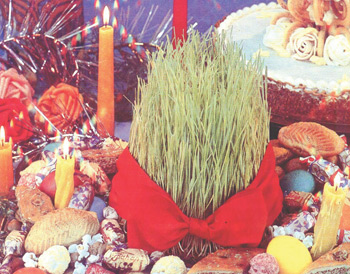 National holidays are connected with myths, history and national identity. They grow out of a people’s spiritual world, the world of their imagination.
National holidays are connected with myths, history and national identity. They grow out of a people’s spiritual world, the world of their imagination.Since ancient times the spring new year has been welcomed by holidays in Azerbaijan, Iran, Afghanistan, Tajikistan, Uzbekistan and other Eastern countries. This ceremony is called Novruz, which means "new day" in Persian. It is marked in the northern hemisphere on the day of the equinox (21-22 March), which is the beginning of spring. The date 21 March is the first day of the official calendar of Iran and Afghanistan.
The origins of the holiday are as ancient as the myths and tales about it. Researchers suppose that Novruz was created by farmers in the Near East. The holiday is thought to date back to the 3rd millennium BC in ancient Babylon. The first records of Novruz as a spring holiday come from 505 BC. In the myths of the ancient Oguz Turks Novruz Bayram is a symbol of abundance. Novruz was marked as a public holiday in the ancient kingdoms of Albania and Atropatena on the territory of modern-day Azerbaijan.
In Persian sources Novruz is the most important of the seven ceremonial holidays of the Zoroastrian faith. Zardusht, founder of the faith and a reformer-prophet, is thought to have lived in the 5th-4th centuries BC. The tradition of purification through jumping over bonfires comes from Zoroastrianism.
Novruz Bayram was widely celebrated as an official holiday in the state of the Sasanids (3rd to 4th centuries AD). States that had official relations with the Sasanids are known to have sent valuable gifts through their envoys at Novruz. In the Middle Ages historical records show that a novruzi tax was levied in some Eastern countries.
European travellers and geographers of the Middle Ages (Adam Oleari) described Novruz Bayram celebrations in Azerbaijan. In his Novruzname Omar Khayyam, the prominent Persian-Tajik poet and philosopher, connected the festivities with the solar calendar. The holiday has been associated with various historical and legendary figures. Abu Reyhan Al-Biruni (973-1048) in his Asap-al-Baqiyya linked Novruz Bayram power. However, according to most historians he came to power in July not March.
Houses are usually cleaned and trees planted before the holiday. Traditionally, construction work and cleaning done before Novruz are thought to have health benefits.
Traditional festive foods are cooked at Novruz Bayram - plov is the main festive dish with qoqal, kulcha, fasali, pakhlava and shakarbura sweets. A tray or khoncha is decorated with coloured eggs, candles, nuts, fruit and festive food. Bonfires are made and the dead are remembered.
Those who have fallen out during the year are reconciled, relatives and neighbours visit and exchange gifts. Ashugs (folk poets and singers) praise the spring, sing and dance. Young men compete in horse riding and wrestling. Traditional games are placed at Novruz -Hakhishta, Banovsha and Kosa-Kosa.
People in the villages visit those who are unable to mark Novruz or are in mourning on the last Charshanba (Tuesday) before Novruz and give them a Samani khonchasi, a tray filled with different sweets and fruits.
An important Novruz symbol is samani, green shoots from wheat seeds. Samani is an essential decoration at the holiday meal and symbolises the revival of nature and abundance. An Azerbaijani peasant grows samani to bring abundance in the coming farming year. Plutarch (46-127) wrote in his Parallel Lives that the people of Midia considered crops to be sacred and on the eve of new year they cooked "omani", a meal made from wheat. "Sumani" means "wheat" in Sanskrit, the ancient language of Northern India. "Omani", "Sumani" and Samani are thought to be linked.
In spite of the bans by the Soviet regime the people of Azerbaijan managed to preserve their Novruz songs, traditions and games. In 1967 the holiday was marked publicly and through State TV at the initiative of Shikhali Kurbanov, Secretary of the Central Commitee of the Communist Party of the Azerbaijan SSR, and supported by Heydar Aliyev, then a major-general in the State Commitee for Security. Novruz Bayram was given the status of an official holiday by decree of the Presidium of the Supreme Soviet of the Azerbaijan SSR issued on 13 March 1990.
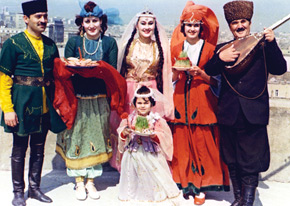
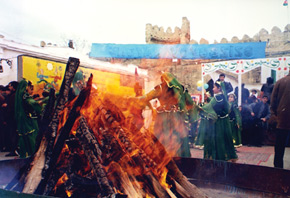
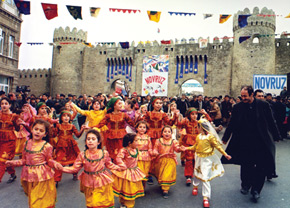

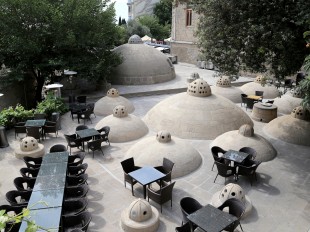
.jpg)